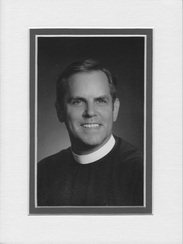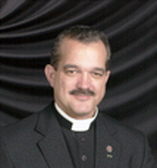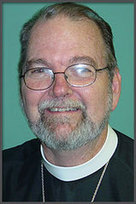 Bible Challenge
Day 358
Zechariah 12, Psalm 146 and Luke 3
Our year-long Bible Challenge is nearly complete and I want to thank all our bloggers and readers for your companionship in this sacred journey. I pray you have found it encouraging and renewing.
Zechariah chapter 12 begins a section of “oracles” that differ from the preceding visions. In chapter 12 we read of a prediction of God’s judgment against “all the nations” that have oppressed Jerusalem and the people of God. Images of a “cup of reeling” and a “flaming torch” serve as vivid portraits of a fierce and destructive day of divine reckoning that precedes the restoration of the reign of the “House of David”. But while I was struggling to cope with the ferocity of these images, suddenly verse 10 includes the image of a great mourning for the “one whom they have pierced”-- a passage that brings to mind the crucifixion and is part of our Good Friday liturgy. The cross of Christ reveals eternally God’s judgment and compassion. In Jesus, we see God’s plans and purposes take flesh. Like a shining shaft of light, this image pierces through Zechariah’s prophesy and connects us to God’s act of ultimate restoration in the coming of Jesus, the messiah.
Luke chapter 3 begins the story of Jesus public ministry and the in-breaking of God’s reign with the baptism of Jesus. All four gospels tell the story of Jesus by first telling the story of John the Baptism and his call to repentance through baptism and a renewed life of justice and mercy. In Luke’s gospel, Jesus’ baptism takes place “off stage” and while Jesus is praying, he receives the stirring affirmation from Abba: “You are my Son, the Beloved; with you I am well pleased”. Luke’s gospel repeatedly emphasizes the role of prayer in providing guidance and direction for our Lord’s ministry, and by extension, our ministries.
This chapter also ends with a genealogy, very different from Matthew’s, but before you are tempted to skip lightly over this section, note that the genealogy ends not with Abraham, as Matthew’s does, but with Adam. Luke, the gentile physician and convert to Christianity, want us to remember that Jesus comes to save all humanity. You and I are included in this story.
Psalm 146 begins the final section of Psalter which contains a series of songs of praise to God. For this, my last blog entry, I join the psalmist in praising God for our year of immersing ourselves in the Bible:
Praise the Lord!
Praise the Lord, O my soul!
I will praise the Lord as long as I live;
I will sing praises toGod all my life long...
The Lord will reign forever,
your God, O Zion for all generations,
Praise the Lord!
Andrew+
 Devotion Luke 2
A number of years ago, my student evangelists and I went into the country side to have an evangelistic mission to start a new church. The host of the mission made the arrangements for us to stay in a two story brick/mud house. The host family stayed and lived upstairs. We had all of our meals upstairs. But when it came time to sleep, we slept downstairs where the rice harvest was stored and where the animals stayed at night for security. We slept on the first floor which was a stable of some sorts. It was common practice in the highlands for visitors to sleep downstairs among the animals.
I’m amazed time and time again about God using the common place to reveal truth. This is clearly demonstrated in the birth of Jesus in Bethlehem. Luke writes as if it was as common as any other child being born “the time came for her to deliver her child. And she gave birth to her firstborn son and wrapped him in bands of cloth, and laid him in a manger, because there was no place for them in the inn” (v6-7). Joseph and Mary stayed in a common place for visitors among the animals. She did what every other mother would do after giving birth, wraps her child in cloth to keep him warm and laid him in a manger, a place for the child to sleep and rest. The manger would be the most suitable and common place to put and protect her child.
I’m also amazed that God revealed truth to the shepherds, the ordinary people going about their common duties. They were watching their sheep at night when an Angel spoke to them and said “I am bringing you good news of great joy for all the people: to you is born this day in the city of David a Savior, who is the Messiah, the Lord” (v11-12). God uses common duties to speak to ordinary people to reveal truth.
Many times people believe they need to prepare the situation, the event, or the timing for God to intervene and reveal his will but in the gospels we see time and time again, God intervenes in common place, common space and common duties.
So during this Christmas season look for the Holy Spirit to reveal’s God will in your common place, common space and common duties.
+Todd
 Zechariah 7-8, Psalm 138, Mark 16
The Lord will fulfill his purpose for me;
thy steadfast love, O Lord, endures forever.
Do not forsake the work of thy hands.
(Psalm 138:8)
Have you ever faced a situation so bad that you instinctively knew that the only consequences for your action would be the anger of the one you offended? Perhaps it is something we did as a child against our parent’s better advice, or as a youth disrespectful of authority, or as an adult in defiance of a spouse or boss. So it was with the chosen people of God. Israel’s misery is addressed by the prophet Zechariah after her destruction and captivity. He delivers the message of God’s wrath which stated, “ ‘As I called, they would not hear, so they called, and I would not hear,’ says the Lord God of hosts, and I scattered them with a whirlwind among all the nations which they had not known…” (Zechariah 7:13-14). But the Good News is that the message does not end there with such doom and gloom.
To our surprise there is a great reversal, and to the remnant there is a promise of hope and restoration. “O house of Judah and house of Israel, so will I save you and you shall be a blessing” (Zechariah 8:13b). Forgiveness and restoration come as a gift of grace, even at the price of reminding us how dire our situation was. The reversal comes because it was so desperately needed. The restoration recalls God’s intended purpose of a responsibility and need to be a people of integrity, honesty, kindness and compassion. To the faithful, to the remnant, there is new life and hope.
The greatest reversal of all time was the resurrection of our Lord. The resurrection overcame the despair of three women stricken by their grief at the tomb, who eventually with the other disciples have their deepest adversity transformed by God’s promise and victory. As we note first, the women were filled with fear and left the tomb in fear. This was not an original happy or joyous ending. Rather an extraordinary beginning started to unfold as God began to lift their sorrow, address their needs, and heal their brokenness. It is the promise that God brings to each and every one of us – in our wounded state and brokenness, that hope never dies and restoration will bring forth new life. This is an important message even now as we have witnessed again through Advent as it prepared us for the celebration of the Holy Incarnation and the breaking in of God’s Light with Christmas. Into the world this Light breaks in to push back the darkness of evil, sin, and disobedience, and rekindles hope, joy, and everlasting life.
__________________________________
The Very Rev. Dr. William L. Stomski,
Chaplain and Sacred Studies Educator, Saint Joseph’s Episcopal School, Boynton Beach
Dean of the Diocesan School for Christian Studies
 The Diocese of Southeast Florida
The Bible Challenge
Zechariah 7&8; Psalm 137; Mark 15
Dear Friends…
Could it be that the authors of The Bible Challenge intentionally chose these specific readings assigned to us for Day 363? Or, were the selections somehow dropped on us this 25th of December by a mysterious, pre-ordained Divine rationale? Why in God’s good name would we be reading passages filled with displacement, mourning, suffering and death on this Joy-filled, holy Feast of the Incarnation? Why?
Let’s explore today’s readings to assist us in our understanding. We read in the 7th Chapter of Zechariah where God’s people are suffering in Babylon. They are displaced and in deep despair because of their disobedience to the Lord. The Psalmist also laments because of the pain of God’s exiled. Yet, Zechariah in Chapter 8 swiftly brings words of promise to restore the beleaguered Jews. “The Lord giveth and the Lord taketh away…” signifies the relationship between God and God’s chosen. Divine providential care seems to be held in the balance of quid pro quo; sinning causes divine retribution while repenting brings salvation. Hold this thought.
Now let’s reflect on Jesus’ arrest, trial, conviction, beating, crucifixion, death, burial and all the horrible emotions which these events thrust upon those who loved him, especially his mom. How does Luke’s passion narrative make it possible for us to say, “Merry Christmas!”? It doesn’t! But yes.., it does! It’s all a part of the same picture.
Do you remember the scene in Mary Poppins where she, the children and Burt are about to jump into a sidewalk chalk painting of a country landscape? Once they jumped into that magical portrait a whole new world opened up for them. They engaged in many exciting adventures which were unimaginable standing on the outside.
The Incarnation is the Portrait. Our spiritual God, made flesh, proclaimed forever holy the flesh and blood of our mortal nature. With the conception and birth of God’s Word we are given the gift of our entryway: Jesus. We jump into the sketch of our Divine intimacy through the waters of Baptism. Once we’re “in” all the potential adventures of a Divine life become ours!
But, God’s holy life for us came at a price. It resulted in the disobedience and suffering of his people Israel as they lost their identity in a foreign land. It took Jesus to face the pain and agony of all the power that Sin could force upon Him. Defeating Satan’s darkness with the Authority of Love, Jesus conquered Death once and forever. Through Jesus’ suffering, death, burial and resurrection we are given an abundance of Grace in this life and life eternal when our mortal vessels rest.
Today, we can say “Merry Christmas!” with the certain joy that God is our great Artist. Without Mary’s “Yes!” there would be no birth of the Messiah. Without Jesus’ “Yes!” there would be no perfect Lamb to offer for our Sin. Without God’s call of the Israelites and their centuries old turbulent relationship of disobedience and repentance, there would be no Davidic line from which the Christ would be born. Without ADAM there would be no original Sin and no need at all for the portrait God has painted for us over these thousands of years of our Salvation History. But God’s artistic rendering is real. It is our story of disobedience and sin redeemed through God’s faithful, never failing love relationship with us.
Maybe, just maybe, that is why we are given scripture readings familiar to Good Friday on this most Joy-filled celebration of God’s Incarnation.
A Very Blessed and Merry Christmas to you and yours….
Fr. Bernie
St. Martin, Pompano Beach
 Recently, I learned a new term. FOMO. I heard it being said in conversation over dinner at the home of one of the families from the St. Simon’s congregation.
“Oh mom,” one child said. “You have FOMO.”
“FOMO?” Curiously, I asked their daughter. “What’s that?”
Fear Of Missing Out.
Heartily I laughed, knowing that I too suffer from family FOMO. When I see both my husband and daughter checked in on Skype, I wonder if they are talking to each other. I don’t want to miss out on the conversation. I want to be involved and engaged in all family matters, which is sometimes a great challenge when living or traveling in separate countries, and during holidays such as the Christmas season.
But Divine FOMO is a good spiritual aspect. We need more FOMO in our walk with Christ.
Why do we fast? Why do we pray? Why do we go to Church? Why do we have so many Christmas services, programs and Nativity plays? Because it makes a difference in our walk with Christ. In a spiritual sense, we don’t want to miss out! It’s good to have Divine FOMO!
Divine FOMO breeds humility; realizing our own weakness and frailty, helps us to see what controls us; we get irritable and ugly and easily frustrated when fast and miss a meal. It helps us to say, “I am sorry. I was wrong. Please forgive me” to God. Divine FOMO helps us to not be judgmental to the hungry man in the Old Testament story when he sold his birthright for a simple bowl of stew.
Divine FOMO is what we experience as we pray as a church community. Together, we see God’s hand at work. When undergoing a crisis, we realize that Christ-is. Community offers to others the gift of song, a prayer when someone is too tired or broken to sing for themselves. It gives some the opportunity to rest awhile, allowing others to carry the load. It allows one to weep as another rises from the couch to get a box of tissues.
Divine FOMO. The divine knowledge that God guides our path to His glory, giving us inexpressible joy. We don’t want to miss out! We live with a wonderful expectation because Jesus Christ is born. This is divine FOMO! Trust in God as Mary and Joseph trusted the prophetic message from the Angel, singing Glory to God in the Highest and Peace to His People on Earth! Search for Christ as the Magi searched for the Newborn King. Divine FOMO. Don't miss out on what God has prepared in advance for His Children who seek Him. Trust, search and rejoice in the Reason of the season!

Zechariah 3-4; Psalm 135; Mark 13
As the Season of Advent ends, the thirteenth chapter of Mark offers somber warnings about how we face the future. Often called the “little apocalypse” of his Gospel, the last verses are heard on the First Sunday of Advent in Year B. They remind us that no one knows the day or the hour of the Lord’s coming. Our calling is to “keep awake,” be alert, watch, take note of things. These verses set the stage for the anticipatory nature of Advent, and help us remember that God may burst into our lives at the most unexpected time in the most unexpected situation. For some, this may seem a little frightening, but for others, it shows how God uses people, places and ideas in ways that open us up to an entirely new way of looking at life.
Sadly, the majority of this chapter has been used by some Christians to point to God’s wrath unleashed upon that with which he disagrees. Everything from AIDS to natural disasters to the loss of elections has been blamed on God’s displeasure with humanity. However, this kind of futuristic theology takes Mark’s message out of context. Most commentaries agree that Chapter 13 is about the fall of Jerusalem and destruction of the Temple in 70 A.D. To make the text into a predictor of events centuries ahead of time dishonors its intent.
As we await God’s greatest gift to us, let us have confidence in a future not filled with fear, but filled with hope, confidence and determination to live into the ministries to which God has called us.
Doug McCaleb
Trinity Cathedral Miami
 Saturday, December 21, 2013
Day 349 – Zechariah 1-2, Psalm 134, Mark 12
Sometimes, as we drift into sleep, or slowly wake up on a
rare day without an alarm clock, we can dream and think at the same time. Every once and a while in this cognitive state of sleep we can interact with our dreams. We can guide them and be guided by them. The majority of Zechariah is a
night vision. It is a divine dream that Zechariah interacts with and dialogs with. Zechariah both sees and converses with the vision. Zechariah both sees and asks.
This night vision illustrates the importance of Jerusalem
to the Lord. In this vision Zechariah sees men and angels and then asks
about their intentions. One man has been sent to measure
Jerusalem. With his stick, this man measures a Jerusalem that is much larger
than before. This Jerusalem, which exceeds its predecessor’s
size, demonstrates the Lord’s love for the city and intention to restore her.
LikeHaggai, Zechariah is concerned with the rebuilding of the
city. There is also a cry for the exiles to return; particularly for those who
are in the north. Together they will make a country that is better then before.
Together they will surpass the past. Together there will be a
holy land, Zechariah 2:12. This is the one and only
time that this region is called the Holy Land in the Bible.
Hopefully peace can prevail in this region. Hopefully
Jerusalem can become a beacon of hope for all people and not just a place of
conflict. Hopefully it is not just a dream.
The Rev. Spencer B. Potter
 – Haggai 1 -2; Psalm 133; Mark 11
“O come, O come, Emmanuel, and ransom captive Israel, that mourns in lonely exile here until the Son of God appear.” Rejoice! Rejoice! Emmanuel shall come to thee O Israel!”
Though brief, the two chapters of the prophet Haggai say much about our modern day Advent and approaching Christmas season. This little book tells us about the folk in and around Jerusalem following the exile period. Many have returned to their homeland and many had just come out of hiding. But whether exiled physically or just spiritually, the Lord through Haggai is calling them back to relationship with their God. The people have been so busy taking care of the own personal needs they have ignored God’s Temple. Through God’s Prophet, Haggai, God chides the people, “are you satisfied with what you have done for yourselves.” “Now therefore thus says the Lord of hosts: Consider how you have fared. You have sown much, and harvested little; you eat, but you never have enough; you drink, but you never have your fill; you clothe yourselves, but no one is warm; and you that earn wages earn wages to put them into a bag with holes.”
God’s message through Haggai is really not so much about the rebuilding of the temple as it is about acknowledging God’s Presence in their lives. The people have lost their sense of unity and purpose. They are attempting to plow through life spiritually impotent. No matter what they have it doesn’t seem like enough. Does this often apply to us? ---- But the Lord takes the lead and through Haggai says, “I am with you.” This is the meaning of the word Emmanuel [God is with us!]. Carl Jung, the famous psychologist had this quote inscribed over is door in latin:
“Vocatus at que non Vacatus Deusadent” – Bidden or not Bidden God is Present!
When the people pull together as a people of God, God is in the midst of them –The Psalmist reminds us today: “Oh, how good and pleasant it is, when brethren live together in unity.”
But, like the post exile people being addressed by Haggai, often we don’t recognize God’s presence in our midst. We have busy lives with much to attend to. Chapter 11 of Mark’s Gospel is another prime example. Jesus is in the midst of God’s people but still to most, goes unrecognized. This Triumphal Entry in Chapter 11, we refer to as Palm Sunday, will culminate in less than a week’s time with shouts of “Crucify Him!” This Messiah, This Emmanuel, born on a starry, starry night in a remote little village will die an earthly death because of humankinds desire to make God’s Presence with us conform to our own design. Jesus enters not as the King he is being proclaimed but as a meek and suffering servant of all.
Let us not continue to look for God’s presence in signs of political power and false majesty but rather in those attributes of a nurturing, guiding, God of love, service and harmony. Lord, let us see you for what you are and acknowledge your presence in our midst. Help each of us to build your temple in our individual and the collective hearts of our sisters and brothers.
“O come, O come, Emmanuel, and ransom captive Israel, that mourns in lonely exile here until the Son of God appear.” Rejoice! Rejoice! Emmanuel shall come to thee O Israel!”
Seasons Blessings,
Tom+
The Venerable Thomas A. Bruttell
Archdeacon, Diocese of Southeast Florida
 Zephaniah 3, Psalm 132, Mark 10
We are presently in what the ancient church calls the Octave before Christmas, (December 17-24) in which traditionally seven antiphons are sung during Vespers. They’re called the O Antiphons and choirs and monasteries, convents and Cathedrals around the world sing a different one each day in preparation for the coming of the Christ. Each song highlights a title for the Messiah: O Wisdom, O Lord, O Root of Jesse, O Key of David, O Rising Sun, O King of the Nations, O Emmanuel. As one gets closer and closer to Christmas we move from looking ahead to finally noticing the present. Emmanuel. God IS with us.
Our readings today do the same… point us to the present reality of God in our midst. It seems as we get closer to the completion of The Bible Challenge, as we get closer to Christmas, as we get closer to yet another New Year time becomes nebulous, don’t you think? We’ve been going back and forth between the past and future and no more so than now in our readings and in our present preparation for Christmas. Maybe that’s the point. Time is supposed to be nebulous in God’s world. Kairos time we call it. We hear in Zephaniah (after those two doomsday chapters) a promise:
I will restore you
I will comfort you
I will save the lame
I will gather the outcast,
I will bring you home
We hear the psalmist speak of the resting place of the Lord… finally settling, “Here is my resting place forever; here I will reside, for I have desired it.”
The poor will be satisfied.
The priests will be clothed with salvation.
The faithful will shout for joy.
And finally in Mark as well: We are with the disciples and Jesus on his way to Jerusalem when Jesus helps us enter into this eternal time on earth as it is in heaven: Enter as a child. Give it all away. The first shall be last. Empty yourself completely and allow me to fill your very being. The first shall be last. Who can be saved? With God all things are possible. The least are the greatest and the blind see.
Ah, of course. God is with us. Emmanuel. No waiting necessary. Blessed Advent tidings.
 Wednesday,
December 18, 2013 or Day 346
Zephaniah 2 Psalm 131 Mark 9 Bible Reflection
A song of humility.
The destruction of Israel’s Enemies. And the Transfiguration.
Today’s reading’s certainly take us on a ride as far as the
themes of scripture go. And that doesn’t even touch on Jesus the healer, the argument amongst the apostles, and the dangers of sin.
But all of this has its culmination in the Transfiguration. Jesus on the mountain top becoming the
Christ. The transfiguration is a seminal moment in the Gospels, and a seminal moment in the life of Peter, James and John. They get to the top of the mountain and they see God! And
the never want to leave! Peter thinks this is it! “rabbi it is good for us to be here!” he says!
“let us make three dwellings!” he says.
We all have these moments. Of Pure unadulterated joy. That experience of a unique oneness with God. And we usually want to stay.
But we can’t.
We must come down of the mountain. We must like
Jesus, head to Jerusalem, not to suffer necessarily, but to continue to call
others to Christ. To allow others their own mountain top experience.
At that moment on top of the hill Peter was
tempted to be selfish with his faith. With his unique relationship with the
Christ. But he saw past the temptation and continued down off the mountain to be the Rock on which the Church was founded.
Let us not be selfish with our own mountain top moments, selfish
with our faith. Come down from your high places friends and seek those who are still in darkness, who have not experienced the transfiguration, who don’t know Christ as we know them. Seek them out, and provide light, and love, to their lives.
Grey Maggiano
|










 RSS Feed
RSS Feed